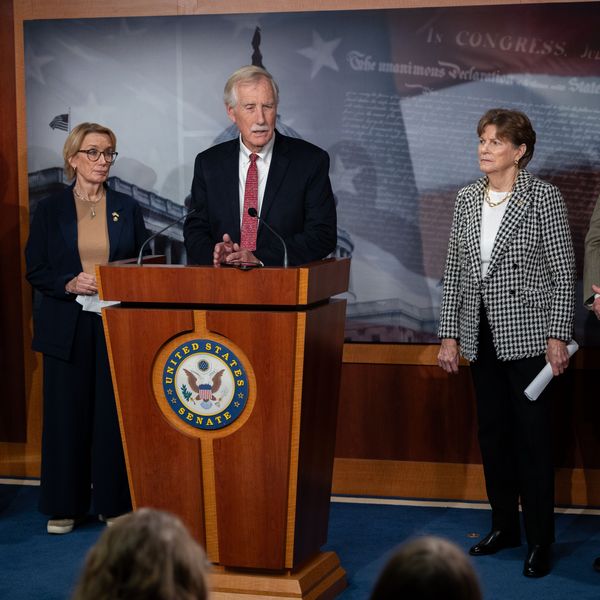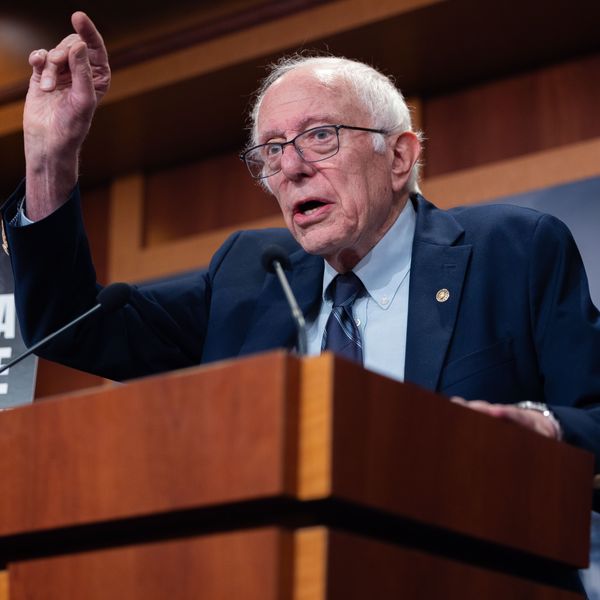Senate Dems Ditch the Public Option
When President Obama spoke to members of Congress the other day about
the need to enact health-care reform he conveniently forgot to mention
the public option.
Senate Democrats got the message.
Their negotiators struck a tentative agreement
Tuesday night to eliminate the "public option" -- the controversial but
necessary plan to set up government-run insurance program to provide
competition (and an incentive to hold down costs) for private insurers.
The negotiators tried to ease the blow to the hopes of progressive
reformers by agreeing to an initiative that would create a number of
national insurance policies that would be developed by the federal
Office of Personnel Management, which oversees health policies for
federal workers, but administered by private firms.
If the private firms fail to do an adequate job, the Senate bill calls for establishment of a genuine public option.
More significantly, the Senate bill proposes to drop the Medicare
eligibility rate to 55, a move that would permit millions of Americans
to buy into the immensely popular federal program for retirees.
These are not inconsequential steps. Nor are the new regulations of
insurance companies that are contained in the Senate bill, which
Democrats leaders now believe they have a genuine chance of passing --
perhaps even gaining a Republican vote, that of Maine's Olympia Snowe.
(But both Snowe are Connecticut Independent Joe Lieberman have
expressed reservations about dropping the Medicare eligibility age.)
But the loss of the public option remains a bitter pill -- especially for progressives who want to expand access to health care and hold down the costs that are run up by insurance company profiteering.
Wisconsin Democrat Russ Feingold lodged the most serious objection,
saying he would not "support proposals that would replace the public
option in the bill with a purely private approach."
"We need to have some competition for the insurance industry to keep
rates down and save taxpayer dollars," said Feingold. "I will base my
vote on the bill on the entirety of what is in the bill, and whether I
think the bill is good for Wisconsin."
Feingold is not alone in his concerns although, as usual, he is the
more willing than most senators to stand on his own against the
leadership.
Where does this leave us?
Senate Majority Leader Harry Reid's still got some serious cajoling to do if he plans to pass a bill before the Holiday break.
An Urgent Message From Our Co-Founder
Dear Common Dreams reader, The U.S. is on a fast track to authoritarianism like nothing I've ever seen. Meanwhile, corporate news outlets are utterly capitulating to Trump, twisting their coverage to avoid drawing his ire while lining up to stuff cash in his pockets. That's why I believe that Common Dreams is doing the best and most consequential reporting that we've ever done. Our small but mighty team is a progressive reporting powerhouse, covering the news every day that the corporate media never will. Our mission has always been simple: To inform. To inspire. And to ignite change for the common good. Now here's the key piece that I want all our readers to understand: None of this would be possible without your financial support. That's not just some fundraising cliche. It's the absolute and literal truth. We don't accept corporate advertising and never will. We don't have a paywall because we don't think people should be blocked from critical news based on their ability to pay. Everything we do is funded by the donations of readers like you. Will you donate now to help power the nonprofit, independent reporting of Common Dreams? Thank you for being a vital member of our community. Together, we can keep independent journalism alive when it’s needed most. - Craig Brown, Co-founder |
When President Obama spoke to members of Congress the other day about
the need to enact health-care reform he conveniently forgot to mention
the public option.
Senate Democrats got the message.
Their negotiators struck a tentative agreement
Tuesday night to eliminate the "public option" -- the controversial but
necessary plan to set up government-run insurance program to provide
competition (and an incentive to hold down costs) for private insurers.
The negotiators tried to ease the blow to the hopes of progressive
reformers by agreeing to an initiative that would create a number of
national insurance policies that would be developed by the federal
Office of Personnel Management, which oversees health policies for
federal workers, but administered by private firms.
If the private firms fail to do an adequate job, the Senate bill calls for establishment of a genuine public option.
More significantly, the Senate bill proposes to drop the Medicare
eligibility rate to 55, a move that would permit millions of Americans
to buy into the immensely popular federal program for retirees.
These are not inconsequential steps. Nor are the new regulations of
insurance companies that are contained in the Senate bill, which
Democrats leaders now believe they have a genuine chance of passing --
perhaps even gaining a Republican vote, that of Maine's Olympia Snowe.
(But both Snowe are Connecticut Independent Joe Lieberman have
expressed reservations about dropping the Medicare eligibility age.)
But the loss of the public option remains a bitter pill -- especially for progressives who want to expand access to health care and hold down the costs that are run up by insurance company profiteering.
Wisconsin Democrat Russ Feingold lodged the most serious objection,
saying he would not "support proposals that would replace the public
option in the bill with a purely private approach."
"We need to have some competition for the insurance industry to keep
rates down and save taxpayer dollars," said Feingold. "I will base my
vote on the bill on the entirety of what is in the bill, and whether I
think the bill is good for Wisconsin."
Feingold is not alone in his concerns although, as usual, he is the
more willing than most senators to stand on his own against the
leadership.
Where does this leave us?
Senate Majority Leader Harry Reid's still got some serious cajoling to do if he plans to pass a bill before the Holiday break.
When President Obama spoke to members of Congress the other day about
the need to enact health-care reform he conveniently forgot to mention
the public option.
Senate Democrats got the message.
Their negotiators struck a tentative agreement
Tuesday night to eliminate the "public option" -- the controversial but
necessary plan to set up government-run insurance program to provide
competition (and an incentive to hold down costs) for private insurers.
The negotiators tried to ease the blow to the hopes of progressive
reformers by agreeing to an initiative that would create a number of
national insurance policies that would be developed by the federal
Office of Personnel Management, which oversees health policies for
federal workers, but administered by private firms.
If the private firms fail to do an adequate job, the Senate bill calls for establishment of a genuine public option.
More significantly, the Senate bill proposes to drop the Medicare
eligibility rate to 55, a move that would permit millions of Americans
to buy into the immensely popular federal program for retirees.
These are not inconsequential steps. Nor are the new regulations of
insurance companies that are contained in the Senate bill, which
Democrats leaders now believe they have a genuine chance of passing --
perhaps even gaining a Republican vote, that of Maine's Olympia Snowe.
(But both Snowe are Connecticut Independent Joe Lieberman have
expressed reservations about dropping the Medicare eligibility age.)
But the loss of the public option remains a bitter pill -- especially for progressives who want to expand access to health care and hold down the costs that are run up by insurance company profiteering.
Wisconsin Democrat Russ Feingold lodged the most serious objection,
saying he would not "support proposals that would replace the public
option in the bill with a purely private approach."
"We need to have some competition for the insurance industry to keep
rates down and save taxpayer dollars," said Feingold. "I will base my
vote on the bill on the entirety of what is in the bill, and whether I
think the bill is good for Wisconsin."
Feingold is not alone in his concerns although, as usual, he is the
more willing than most senators to stand on his own against the
leadership.
Where does this leave us?
Senate Majority Leader Harry Reid's still got some serious cajoling to do if he plans to pass a bill before the Holiday break.

